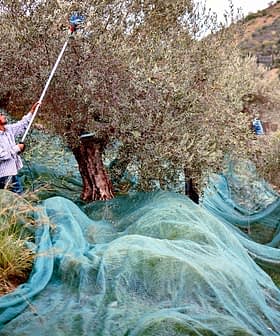Polyphenols Shown to Have Distinct Anti-Bacterial Properties
Research on the antibacterial activity of olive varieties grown in southern Italy shows promise for natural treatments against E. coli and Pseudomonas aeruginosa.
New research from Italy shows that different olive varieties have varying antibacterial properties based on their polyphenol profiles. The study conducted by researchers at the National Research Council’s institute of food sciences and the University of Salerno found that the polyphenol extracts from three olive varieties were effective in inhibiting the growth of pathogenic bacteria, including those responsible for biofilm formation. The researchers suggest that further exploration of natural medications based on optimal mixtures of polyphenols could lead to new treatments for bacterial infections.
Olive varieties with different polyphenol profiles have different antibacterial properties, according to new research out of Italy.
Researchers at the National Research Council’s institute of food sciences (ISA-CNR) and the University of Salerno tested the antibacterial activity of three olive varieties. Their findings now pave the way for the exploration of new natural medication.
This could be a basis of complementary studies to formulate ideal drugs of natural origin, composed of optimal mixtures of polyphenols.
“We first conducted a study concerning the biochemical profile, including volatile compounds, and the relationship between the antioxidant activity and polyphenols of extra virgin olive oils obtained by autochthonous varieties of Campania, Ruvea Antica, Ravece, and Ogliarola,” Filomena Nazzaro, a scientist at the ISA-CNR, told Olive Oil Times. “Then, in a second experiment, we analyzed the antibacterial activity correlated to the polyphenol profiles of the above-mentioned varieties.”
“This last research, in particular, examined the inhibitory effect of the polyphenolic extracts against several gram-positive and gram-negative bacterial strains,” she added. “They gave us remarkable results in terms of their activity against pathogenic species, namely those that are responsible for the formation of biofilms, which are very interesting when it comes to human health since they increase the resistance of bacteria to synthetic antibiotics.”
See Also:Research NewsThe analysis of the polyphenol fractions of the extra virgin olive oils confirmed well-known antibacterial properties, showing that the qualitative and quantitative profile of polyphenols can affect those properties in different ways.
The researchers applied a statistical method to predict the synergistic effect of polyphenols and the influence of each of them, based also on their amount, on the activity of the whole extract.
The tests were performed using 2.5 and 4.9 micrograms of the three polyphenol extracts against different pathogens. The results showed that the minimum concentration necessary to inhibit the growth of the pathogenic tester strains was low for all the polyphenolic extracts, and this confirmed their general capacity to inhibit the growth of pathogenic or unwanted microorganisms.
“In particular, all three extracts were effective in inhibiting the growth of Escherichia coli [with 4.9 micrograms of polyphenolic extracts from Ravece and Ogliarola],” Nazzaro said. “In our opinion, this result could find an interesting practical application, since this bacterium is one of the causes of urinary tract infections. Research on polyphenolic extracts, as well as essential oils, are actually opening new horizons in the treatment of, for example, common catheter infections, which are painful and difficult to eradicate.”
The three extracts also were found to be capable of inhibiting the growth of Pseudomonas Aeruginosa, a well-known pathogen that is responsible for the formation of the aforementioned biofilms.
The extracts of Ogliarola and Ravece were more effective than those of Ruvea Antica in inhibiting the growth of the strain; in particular, 2.5 micrograms of polyphenols extract of Ravece were twice as effective as that of Ruvea Antica against Pseudomonas Aeruginosa; 4.9 micrograms of Ravece polyphenols extract were three times more effective than those of Ruvea Antica.
The researchers studied the antioxidant activity of the extracts following the same methodology, with extra virgin olive oils from varieties grown in the same plot of land at the same time. This limited the variables involved and led to the finding that Ruvea Antica contained the greatest amount of total polyphenols, showing the highest antioxidant activity.
The research team also suggested that it would be interesting to conduct this research on several varieties, in different years.
“This could be a basis of complementary studies to formulate ideal drugs of natural origin, composed of optimal mixtures of polyphenols, which are able to exercise with the minimum effort, in terms of quantity, and the maximum result, namely against the greatest number of pathogens, their antibacterial efficacy,” Nazzaro said. “Future research should also take into account the use of the extra virgin olive oil by-products, which are rich in polyphenols.”
“Moreover, this makes us understand the importance of assuming that every day a fair amount of extra virgin olive oil, which is digested and transformed into molecules that are beneficial for our microbiome, also counteracts the growth of pathogenic species,” Nazzaro concluded.









